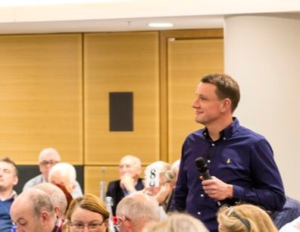Diversity is key to any modern Boardroom, but concentrating on only one form of diversity isn’t enough; a Board should represent every aspect of the organisation or community it represents. Nick Crofts shares some personal insights of his experience around what the modern Board should look like, challenges he has faced, and ways to overcome these challenges, in relation to his role as Chair at Wythenshawe Community Housing Group. This is the first of a new series of articles and interviews with senior leaders, who we have placed into Boards across the public sector.

What motivated you to become the Chair of a social housing organisation?
I know from first-hand experience the difference that a safe, affordable, good-quality and accessible home can make to a person’s life. I lived in social housing from age 7 to 22, after my family was made homeless. I’ve been so glad to have the chance to support the sector by getting involved in its governance – working to extend the opportunity of safe, affordable, good-quality and accessible homes to more people.
As you progressed in your non-executive career, was there any advice you received that has proved to be invaluable?
I’ve been lucky enough to have had a number of non-executive mentors over the years. The two key pieces of advice that I’ve had that really were invaluable were always to properly interrogate the meeting papers – and if there’s anything in them that you don’t understand, then ask; ideally ahead of the meeting! And then secondly, to value good-quality relationships with the executives around the table. You want to be able to have a frank dialogue, and to be in position to offer challenge, and sometimes even very robust challenge; to do that, and ensure that it lands well, it has to be constructive challenge and better yet, offered in the context of a strong and trusting and supportive relationship.
Taking a national view, do you feel that the boards of social housing providers are taking enough positive steps to become genuinely diverse? If not, what more can they do?
No. Progress has certainly been made. But it has been achingly slow. I have always been the only LGBT Board member at the tables I’ve sat around; some Boards have had – and continue to have – a significant gender imbalance; many are hugely unrepresentative of Black people and people of colour. Many Boards are overheavy with older people and often the boardroom is a young-person-free-zone. Diversity of thinking suffers as a direct result of the failures to gain a diversity of backgrounds around the table. The new six-year term limit is an opportunity for providers to open up their doors to new people, with new thinking; younger people; women; and Black people and people of colour. Provider must be bolder and do much more and better to reach into communities to encourage people and to foster talent.
Reflecting on your own personal experience, what are the specific leadership qualities which a good Chair should demonstrate?
An effective chair must be inclusive, and make sure everyone is a participant. They must invest in relationships with their Board colleagues and with their Executive teams – trust is vital. They must be curious, and take the time to get to know their organisations to get a feel for key issues and challenges and opportunities. They must be able to shape and influence – and sometimes even control – a Board meeting to keep things on track. And very importantly, in my experience, an excellent chair can display good humour and make the experience of being a Board member a pleasant one. Sometimes what we do can be quite dry – that doesn’t mean meetings need to be boring!
What do you consider to be the main challenges facing social housing boards over the next three years?
So many. Supporting our customers and tenants through unprecedented economic challenges and the cost of living crisis; the continued housing crisis and lack of supply; the requirement to decarbonise and at pace; cost pressures on the wider value-add services that we provide to make communities flourish. And a continued sense that the sector as a whole punches under its collective weight, not least with government. Passionate local providers can and do make a huge difference in their communities – so not losing sight of why we are doing the work we do is crucial.
What advice would you give someone who aspires to be a Chair?
Go for it! The sector is crying out for new people with a sense of purpose, who can make things happen and who can add value. If this is you – be curious, read and learn, network with other Board members, get a mentor, broaden your experience, talk to the recruiters. And make applications! You may well not get the first chair’s role you apply for. I didn’t. Don’t let that dissuade you – keep going!
We would really welcome your views and insights into the modern Board, or if you’d like to discuss your Board challenges and how we can help, please contact Nick Roberts, Principal Consultant – Housing , or Zoe Wortley, Partner – Board Practice.
